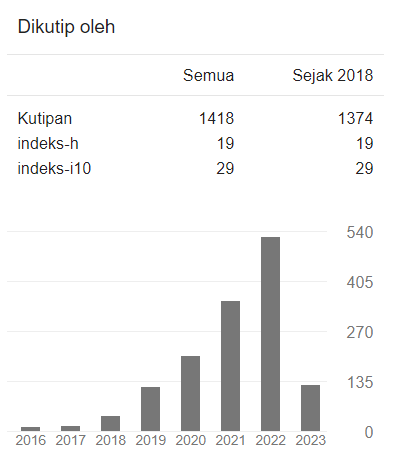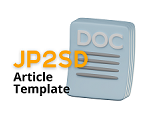Peningkatan Minat Belajar Siswa Tunagrahita Menggunakan Model STAD Berbantuan Puzzle di Kelas 1 Sekolah Dasar
DOI:
https://doi.org/10.22219/jp2sd.v9i1.15182Abstract
Tujuan penelitian ini untuk meningkatkan minat belajar matematika siswa tunagrahita kelas 1 SD melalui strategi pembelajaran kooperatif gaya STAD berbantuan puzzle. Subjek penelitian ini adalah Mudayaroh, S. Pd selaku wali kelas 1 SD Islam Plus Al-Mudhofar dan Novia Fitri Iman Sari S. Pd selaku guru pendamping khusus yang bertindak sebagai subjek yang memberikan tindakan, Kepala SD Islam Plus Al-Mudhofar sebagai subjek yang membantu dalam pengumpulan data, sedangkan siswa kelas 1 tunagrahita SD Islam Plus Al-Mudhofar Tahun Ajaran 2020/ 2021 yang berjumlah 2 siswa perempuan sebagai subjek peneliti yang menerima tindakan. Metode pengumpulan data yang digunakan dalam penelitian ini adalah observasi, catatan lapangan dan dokumentasi. Data dianalisis melalui tiga tahap yang terdiri dari reduksi data, penyajian data dan penarikan kesimpulan. Pada siklus II, persentase nilai DS adalah: 82% untuk persentase menyebutkan angka, 82% untuk persentase menyamakan angka ,84% untuk persentase menambahkan angka, dan 87% untuk pesentase mengurangi angka. Sedangkan SH memperoleh persentase nilai 75% untuk menyebutkan angka, 75% untuk menyamakan angka, 78% untuk menambahkan angka, dan 74% untuk mengurangi angka, dapat disimpulkan bahwa pembelajaran kooperatif gaya STAD dengan menggunakan media puzzle bilangan dapat meningkatkan kemampuan komunikasi matematis dan minat belajar siswa SD tunagrahita kelas I.
Downloads
References
Andri, R., & Violita, V. (2020). The Effect of Cooperative Learning Models Type Student Team Achievement Division ( STAD ) and Intrapersonal Intelligence on the Learning Competency of Students Class X SMA Adabiah 1 Padang. 72–78.
Basori, E. R. (2018). Pengaruh Pembelajaran Matematika Realistik terhadap Kemampuan Berhitung Anak Tunagrahita Ringan Kelas 1 di SD Inklusi Glagahwero 01. Journal of Special Education, I(2), 1–4.
Dewi, L. M. S., Wibawa, I. M. C., & Tri Agustiana, I. G. A. (2020). Improving Science Learning Outcomes Through Student Team Achievement Division (STAD). International Journal of Elementary Education, 4(3), 329. https://doi.org/10.23887/ijee.v4i3.25917
Dian Andari Hania, R. W. (2016). The Use of Puzzle 3D Puzzle in Therapy Media Fine Motor Skill to Autis Syndrom at Talenta’s Therapy Semarang. BELIA: Early Childhood Education Papers, 5(1). https://doi.org/10.15294/ijeces.v5i1.11278
Endang Warman, S. P. (2017). MENGEMBANGKAN MINAT BELAJAR ANAK TUNAGRAHITA RINGAN MENGGUNAKAN MEDIA PEMBELAJARAN PUZZLE ANGKA DI SKH NEGERI 02 KABUPATEN LEBAK.
Erbil, D. G. (2020). A Review of Flipped Classroom and Cooperative Learning Method Within the Context of Vygotsky Theory. Frontiers in Psychology, 11(June), 1–9. https://doi.org/10.3389/fpsyg.2020.01157
Gemi, S. (2020). The Differences in Mathematics Learning Outcomes of Students Taught by Cooperative Learning Students Teams Achievement Division Type and Cooperative Learning Type of Group Investigation Model in High School. 1(January), 115–122. https://doi.org/10.31327/icusn-adri.v1i0.1151
Hasyda, S., & Djenawa, A. (2020). Penerapan Pembelajaran Kooperatif Picture and Picture Bermedia Mind Map untuk Meningkatkan Kemampuan Literasi Sosoal Pada Peserta Didik Sekolah Dasar. Jurnal Basicedu, 4(3), 696–706. https://doi.org/10.31004/basicedu.v4i3.414
Israil, I. (2019). Implementasi Model Pembelajaran Cooperative Learning Tipe STAD untuk Meningkatkan Motivasi Belajar Siswa dalam Pembelajaran IPA di SMP Negeri 1 Kayangan. Jurnal Kependidikan: Jurnal Hasil Penelitian Dan Kajian Kepustakaan Di Bidang Pendidikan, Pengajaran Dan Pembelajaran, 5(2), 117. https://doi.org/10.33394/jk.v5i2.1807
Jebril, T., & Chen, Y. (2020). The architectural strategies of classrooms for intellectually disabled students in primary schools regarding space and environment. Ain Shams Engineering Journal, xxxx. https://doi.org/10.1016/j.asej.2020.09.005
Karalina, V. (2020). PERANAN PERMAINAN PUZZLE UNTUK MENINGKATKAN KEMAMPUAN KOORDINASI MOTORIK HALUS BAGI ANAK AUTIS. 1–8.
Kim, D. (2018). A study on the influence of Korean Middle School Students’ relationship through science class applying stad cooperative learning. Journal of Technology and Science Education, 8(4), 291–309. https://doi.org/10.3926/jotse.407
Ling, W. N., Ghazali, M. I., & Raman, A. (2016). The effectiveness of student teams-achievement division (STAD) cooperative learning on mathematics achievement among school students in Sarikei District, Sarawak. International Journal of Advanced Research and Development, 1(3), 17–21.
Mardini, S. (2016). Meningkatkan Minat Belajar Anak Berkebutuhan Khusus Di Kelas Reguler Melalui Model Pull Out Di Sd N Giwangan Yogyakarta. JURNAL JPSD (Jurnal Pendidikan Sekolah Dasar), 2(1), 25. https://doi.org/10.26555/jpsd.v2i1.a4952
Melliana, P. S., Widyantoro, W., & Anisa, O. (2018). PERMAINAN PUZZLE MENINGKATKAN KEMAMPUAN MOTORIK HALUS ANAK TUNAGRAHITA SEDANG KELAS 1-3 SDLB NEGERI SLAWI Abstrak PENDAHULUAN Kemampuan motorik halus anak usia dini hampir sama dengan kemampuan motorik halus anak tunagrahita kategori sedang walaupun kateg. STIKes Bhakti Mandala Husada Slawi.
Miragliotta, E., & Baccaglini-frank, A. (2018). Visuo-spatial abilities and geometry : A first proposal of a theoretical framework for interpreting processes of visualization To cite this version : HAL Id : hal-01950545 Visuo-spatial abilities and geometry : A first proposal of a theoretical.
Nasution, M. L., & Hafizah, N. (2020). Development of students’ understanding of mathematical concept with STAD type cooperative learning through student worksheets. Journal of Physics: Conference Series, 1554(1). https://doi.org/10.1088/1742-6596/1554/1/012035
Niswati, Z., Irawan, A., Syamsiah, Febriyanti, C., Kencanawaty, G., & Rangka, I. B. (2020). The Design and Development of Android-Based “Puzzle Games” Mathematics Learning Media. 464(Psshers 2019), 575–578. https://doi.org/10.2991/assehr.k.200824.133
Putra, F. G., Widyawati, S., & Ariyani, S. (2020). An experiment on connecting , organizing , reflecting , and extending ( core ) learning model and learning styles : the interaction and effects on mathematical communication skills 1. 1(June), 37–42.
putri ambarwati1, putri syifa darmawel2. (2020). IMPLEMENTASI MULTIMEDIA DEVELOPMENT LIFE CYCLE PADA APLIKASI MEDIA PEMBELAJARAN UNTUK ANAK TUNAGRAHITA. 18(2), 51–58.
Rahayu, T., Syafril, S., Wati, W., & Yuberti, Y. (2017). The Application of STAD- Cooperative Learning in Developing Integrated Science on Students Worksheet. Jurnal Ilmiah Pendidikan Fisika Al-Biruni, 6(2), 247. https://doi.org/10.24042/jipfalbiruni.v6i2.1933
Saputri, P. (2020). Pendekatan Cooperative Learning Tipe STAD : Peningkatkan Keterampilan Membuat Bantal Karakter Pada Anak Tunagrahita Ringan. 5(1), 41–48.
Sari, L., Pratama, R. A., & Permatasari, B. I. (2020). Media Pembelajaran Puzzle Angka dan Corong Angka (PANCORAN) Bagi Anak Berkebutuhan Khusus (ABK). Kreano: Jurnal Matematika Kreatif-Inovatif, 11(1), 88–100. https://doi.org/10.15294/kreano.v11i1.23618
Slavin, R. E. (1980). Cooperative Learning. Review of Educational Research, 50(2), 315–342. https://doi.org/10.3102/00346543050002315
Suarmini, kadek ayu. (2020). TERAPI BERMAIN BAGI TUNA GRAHITA DI SLB NEGERI 2 SINGARAJA BALI. Jurnal Peduli Masyarakat, 2(September), 59–64.
Sudarto, Z. (2020). Modification of Puzzle Play As Mathematical Learning Media in Lightweight Mental Retardation Children. Jurnal Pendidikan Inklusi, Vol 3. No(e-ISSN: 2580-9806), 117–128.
Sufi, L. F. (2016). Meningkatkan Kemampuan Komunikasi Matematis Melalui Model Pembelajaran Probem Based Learning. Prosiding Konferensi Nasional Penelitian Matematika Dan Pembelajarannya, 7(Knpmp I), 260–267. https://publikasiilmiah.ums.ac.id/bitstream/handle/11617/6965/27_64_Makalah Rev Laili Fauziah Sufi.pdf?sequence=1
Sugiyono. (2010). Metode Penelitian Kuantitatif & kualitatif. In Journal of Experimental Psychology: General.
Suherti, P. (2011). Penerapan Pembelajaran Kooperatif Tipe Student Teams Achievement Divisions (STAD) di Sekolah Inklusi. Jurnal Asesmen Dan Intervensi Anak Berkebutuhan Khusus, 10(1), 42–50.
Sutinah, S. (2019). Terapi Bermain Puzzle Berpengaruh Terhadap Kemampuan Memori Jangka Pendek Anak Tunagrahita. Jurnal Endurance, 4(3), 630. https://doi.org/10.22216/jen.v4i3.4385
Trisnawati, R. A. (2019). Aplikasi Multimedia Sebagai Media Pembelajaran Mengenal Bilangan Untuk Anak Tunagrahita.
Yulia Rahmadani, Thamrin Tayeb, B. (2018). MODUL MATEMATIKA BERBASIS MODEL KOOPERATIF TIPE STAD lantaran mengikuti perkembangan zaman , teknologi , dan budaya masyarakat . Didalam Pembukaan UUD 1945 dinyatakan bahwa tujuan membentuk Negara Kesatuan Republik Indonesia ialah untuk mencerdaskan kehid. c, 23–32.
Yunanto, S. H., & Chandrawati, T. B. (2017). “Smart Puzzle” Game Helping Children Learn to Read. Sisforma, 3(1), 13. https://doi.org/10.24167/sisforma.v3i1.677
Downloads
Published
Issue
Section
License
Copyright (c) 2021 Jurnal Pemikiran dan Pengembangan Sekolah Dasar (JP2SD)

This work is licensed under a Creative Commons Attribution-ShareAlike 4.0 International License.
Authors who publish with Jurnal Pemikiran dan Pengembangan Sekolah Dasar (JP2SD) agree to the following terms:
- For all articles published in Jurnal Pemikiran dan Pengembangan Sekolah Dasar (JP2SD), copyright is retained by the authors. Authors give permission to the publisher to announce the work with conditions. When the manuscript is accepted for publication, the authors agree to automatic transfer of the publishing right to the publisher.
- Authors retain copyright and grant the journal right of first publication with the work simultaneously licensed under a Creative Commons Attribution-ShareAlike 4.0 International License that allows others to share the work with an acknowledgment of the work's authorship and initial publication in this journal.
- Authors are able to enter into separate, additional contractual arrangements for the non-exclusive distribution of the journal's published version of the work (e.g., post it to an institutional repository or publish it in a book), with an acknowledgment of its initial publication in this journal.
- Authors are permitted and encouraged to post their work online (e.g., in institutional repositories or on their website) prior to and during the submission process, as it can lead to productive exchanges, as well as earlier and greater citation of published work (See The Effect of Open Access).

This work is licensed under a Creative Commons Attribution-ShareAlike 4.0 International License.


















